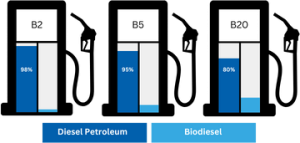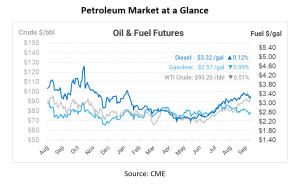
B5 vs. Diesel #2: What You Need to Know
Truck drivers and operators face many choices in how they fuel their equipment. Should they choose regular diesel #2, try renewable diesel, or experiment with biofuels like B5, B20, or even B99? Among these choices, one thing often confuses people: Is B5 different from regular diesel, and is it a good choice? Well, the answer is quite simple, and there’s no need to worry – B5 is just diesel!
As you approach a diesel fuel pump, you’ve likely encountered a familiar sign that reads, “This product contains up to 5% biodiesel.” Just as gasoline can contain up to 10% ethanol, almost all diesel fuel in the United States contains some level of bio content, unless it’s a specialized “non-bio” fuel intended for a laboratory or other specialized purposes.

According to Andy Milton, Senior Vice President of Supply and Distribution at Mansfield Energy, the ASTM specification for Ultra-Low Sulfur Diesel (ULSD) allows for up to 5% biodiesel. “It meets all engine manufacturer warranties and is becoming more common every day. In many markets, it’s the only product available,” he explains.
ASTM D975 is the regulatory standard for diesel quality across the United States. According to the US Department of Energy, blends up to B5 (5% biodiesel, 95% petroleum diesel) are considered petroleum diesel and approved for use in existing diesel infrastructure. Blends above B5 may be subject to additional requirements. It basically means that all diesel fuel in the US can contain up to 5% biofuel and still be considered legally as diesel #2.
The quantity of biofuels in regular diesel may vary depending on blending economics. When biofuels are more expensive than petroleum-based diesel, blending is typically limited to a minimal amount. However, when biofuel prices decline below fuel prices, all fuels often contain the maximum allowable bio content to help keep overall fuel prices lower.
So, the next time you’re faced with the decision of whether to opt for “traditional” diesel #2 or a B5 blend, remember that they are essentially equivalent. B5 is approved for use in all engines and often has the same content as diesel #2.
Reliable Fuel Supply Across North America
If you want to know what type of fuel would be a good fit for your fleet, reach out to Mansfield Energy. Our experts will take a close look at your operations and current fuel costs to give you details about the economic, environmental, and operational benefits you can expect.
Mansfield Energy provides reliable fuel supply across North America at competitive, market-based prices. For refined fuels, including diesel, gasoline, biofuels, and kerosene, we make sure you always have the fuel when and where you need it.
Contact our experts today!

This article is part of Daily Market News & Insights
Tagged:
MARKET CONDITION REPORT - DISCLAIMER
The information contained herein is derived from sources believed to be reliable; however, this information is not guaranteed as to its accuracy or completeness. Furthermore, no responsibility is assumed for use of this material and no express or implied warranties or guarantees are made. This material and any view or comment expressed herein are provided for informational purposes only and should not be construed in any way as an inducement or recommendation to buy or sell products, commodity futures or options contracts.





